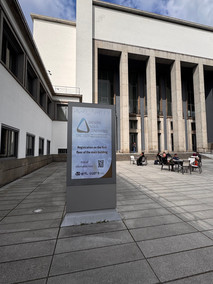Dresden Nexus Conference - DNC 2025. The future of resources. Resources for the Future
- TIC UNESCOSOST
- 1 day ago
- 2 min read
On April 9th, 2025, at the prestigious Dresden Nexus Conference (DNC 2025), Dr. Jordi Morató — Director of the UNESCO Chair on Sustainability and Coordinator of the SureNexus PRIMA Project — presented the AI-Driven WEFE Nexus Model Tool, developed over the past two years as part of the SureNexus initiative.

The Dresden Nexus Conference (DNC) is a renowned international platform that brings together scientists, policy-makers, and practitioners to explore integrated approaches to managing environmental resources. Held biennially in Dresden, Germany, the 2025 edition focused on “The future of resources. Resources for the Future", showcasing innovative strategies to address interconnected challenges in water, energy, food, and ecosystems. DNC 2025 provided a unique space for cross-sectoral dialogue, knowledge exchange, and the presentation of pioneering solutions — such as those developed within the SureNexus Project.
Our presentation took place during Session A2: A Robust Definition of the NEXUS, which was organized into three distinct parts. The session began with a panel discussion moderated by Antonella Autino, Programme Coordinator at the PRIMA Foundation (Barcelona, Spain). The discussion focused on exploring evolving understandings of the NEXUS concept. Notably, emerging perspectives such as the Resource Nexus were introduced as alternatives or complements to the more traditional WEFE Nexus approach.
Following the panel, three case studies were selected to present lessons learned from practice, offering reflections on the operationalization and definition of the Nexus at different scales. Dr. Jordi Morató, coordinator of the SureNexus PRIMA Project presented one of these case studies, contributing valuable insights drawn from field experience. The presentation “SURENEXUS Project: Innovative Methodology for Technology Selection Utilizing AI within the WEFE Nexus Framework,” highlighted an advanced methodology developed through a close collaboration between the UNESCO Chair on Sustainability and the INLAB research group at UPC. The showcased model combines cutting-edge Artificial Intelligence (AI) with WEFE Nexus principles, offering a strategic process and digital toolkit to support the selection of sustainable technologies in complex water-energy-food-ecosystems contexts. Drawing from real-world field experience, the presentation demonstrated how this innovative approach can accelerate impactful solutions in the Mediterranean and beyond.
The session concluded with the presentation of the WEFE and Resource Nexus Community Survey, with highlights of key observations and findings shared by Dr. Daniel Karthe, Dr. Ali Rhouma, and Dr. Floor Bouwer.
This participation reaffirms the leadership role of the UNESCO Chair on Sustainability in promoting science-based, inclusive, and tech-enabled approaches to tackle pressing environmental and socio-economic challenges.
The day was also rich in activity, with numerous networking opportunities and engaging exchanges taking place with researchers from various institutions and disciplines. These interactions helped to strengthen existing collaborations and open new avenues for potential joint initiatives and knowledge sharing.
🔗 Learn more about the SureNexus project: https://surenexus.eu

















Comments